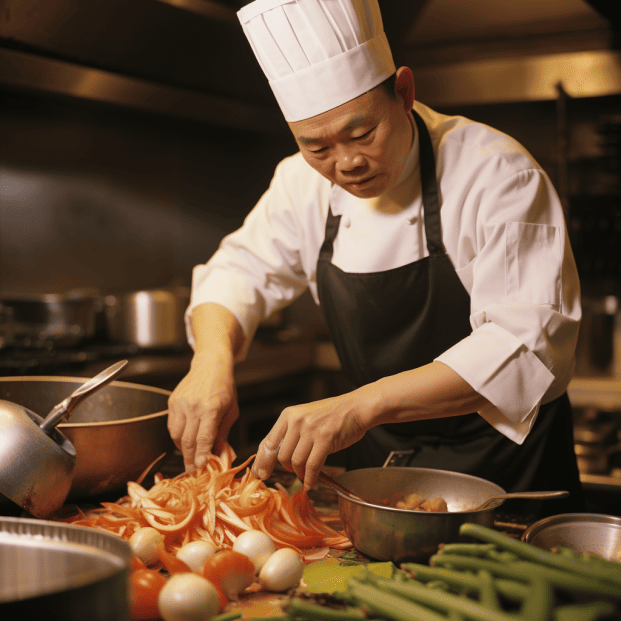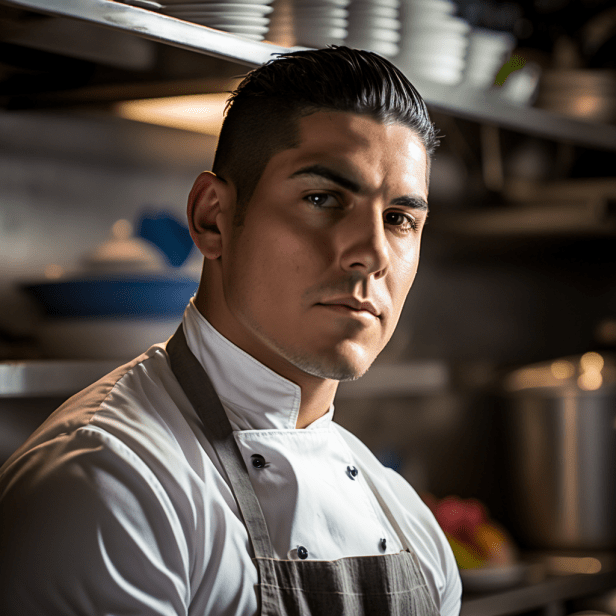Onions – some love ’em, others wanna leave ’em! But in China, raw onions are a popular tradition.
Why do Chinese eat raw onions?
As a Chinese food fanatic, I just had to dig deeper to understand this peculiar practice.
Put on your detective hats, folks – we’re going sleuthing! You’ll discover the health claims behind raw onions, etiquette tips for onion-eating, and creative ways Chinese dishes use these tear-jerking bulbs.
I’ll tap into ancient Chinese wisdom and modern food science to get to the roots of this tradition.
You’ll even pick up some killer onion-centric recipes to wow dinner guests!
By the end, the secrets of China’s raw onion tradition will be laid bare.
You can decide if you’re pro-onion or no-nion!
But fair warning – this quest may end in cravings for piping hot pot with heaps of raw onions and Chinese products.
If you’re ready to dive into a flavorful cultural tradition, let’s get peeling!
Arm yourself with breath mints and a taste for adventure – our Chinese onion odyssey awaits.
KEY TAKEAWAY
Why do Chinese eat raw onions?
Raw onions are often used in Chinese cuisine for their unique flavor, crunch, and health benefits. They add a distinct taste and texture to dishes, contributing to the complexity and balance of flavors. (1)
The Time-Honored Tradition of Raw Onions in Chinese Cuisine
For centuries, raw onions have been a cornerstone of traditional Chinese cooking.
But what led to this peculiar practice taking root? As an avid explorer of Chinese cuisine, I decided to peel back the layers on this distinctive food tradition.
It turns out raw onions play several integral roles in Chinese fare beyond just flavor.
They are often used to garnish or mix into dishes like stir-fries, salads, and dumplings, where their pungent zing enhances other ingredients beautifully.
The crunchy texture they add also delights the palate.
But the benefits of raw onions go much further.
They contain powerful antioxidants, vitamin C, vitamin B6, and special sulfur compounds that strengthen immunity, reduce inflammation, improve digestion, and more.
It’s no wonder they are revered in Chinese culture!
In traditional Chinese medicine, raw onion consumption is thought to stimulate circulation, flush toxins, and benefit lung health.
Their robust aroma is even believed to ward off evil spirits and attract good fortune.
So raw onions provide both physical and symbolic nourishment in Chinese cuisine.
This time-treasured food tradition preserves cultural beliefs while also nurturing the body through their unique health properties.
Chinese Medicine Claims: Do Raw Onions Really Have Health Benefits?

For centuries, Chinese medicine has touted raw onions as potent natural healers.
But is there any validity to these bold health claims? Let’s unravel the evidence.
In Chinese medicine philosophy, the body is seen as an interconnected system where imbalance in one area can cause dysfunction elsewhere.
Raw pungent onions are thought to contain compounds that can restore equilibrium and promote vitality. (2)
Specifically, raw onions are believed to offer wide-ranging benefits like calming inflammation, supercharging the immune system, easing digestive issues, and even suppressing growth of cancer cells.
Their harshness is considered medicinal.
While current scientific literature on the curative powers of raw onions is limited, the long legacy of their use in Chinese culture provides unique insights.
It illustrates a holistic worldview linking food and medicine.
Regularly eating raw onions in beloved Chinese dishes like spicy hot pot not only enhances flavor – it may also enhance wellbeing in multiple ways.
More research can help substantiate these time-honored folk remedies.
Beyond Bad Breath: Raw Onion Etiquette and Prevention Tips

While raw onions provide a flavor punch, they can also pack a mean post-meal punch to your breath! Here are some tips if you want to savor onions while sparing those around you.
When you eat raw onions, their sulfur compounds enter your bloodstream and later release through your lungs and pores after metabolizing – leaving an infamating lingering scent many find offensive.
It’s caused by substances like allyl methyl sulfide.
To help neutralize onion breath, try chewing fresh parsley, mint, or citrus rinds post-onion, which aid digestion.
Drinking lemon water or green tea also helps by diluting odor compounds.
Using hydrogen peroxide rinses, green tea mouthwash, or anti-odor supplements like chlorophyll or activated charcoal can also combat odors.
Staying hydrated and avoiding alcohol helps your body flush smelly sulfur compounds faster too.
If you plan to eat onions before social gatherings or romantic encounters, give your companions a heads up.
This allows them to take precautions like using breath mints, chewing parsley, or avoiding onions themselves.
Being mindful, courteous, and prepared means you can fully enjoy pungent raw alliums without the social stigma.
With the right etiquette, you can savor onions to your heart’s content without sending others away offended!
Not Just Garnish: Creative Ways Chinese People Eat Raw Onions
In China’s multifaceted regional cuisines, the humble raw onion transcends basic garnish status into a remarkably versatile ingredient.
Here are some clever culinary applications:
Finely chopped raw spring onion greens add a perfect acidic punch when used to garnish noodle and rice dishes, soups, dumplings, stews, and more.
They pull flavors together like the final brushstroke on a painting.
Thinly sliced milder raw chives and Chinese chives blend seamlessly into omelets, savory pancakes, vegetarian scrambles, and sautéed or braised veggie sides.
You get hints of onion essence without dominating the dish.
Thinly sliced raw onions soaked in a sweet vinegar marinade temper their bite into a pleasant addictive side dish with a tantalizing tang.
Stir-fried minced raw onions caramelize with other aromatics as the flavor foundation for countless regional specialties across China.
From texture and garnish to main attraction, innovative Chinese chefs showcase the incredible depth and versatility of the humble onion in all its raw glory.
Raw Onion Dishes to Try From Different Regions of China
China’s vast landscape is home to a mosaic of culinary traditions uniquely showcasing the raw onion.
Let me take you on a cross-country food odyssey to savor some of these regional onion-centric delicacies firsthand:
In eastern Shandong province, the signature ‘Pai Huanggua‘ salad is a precious summer jewel – cool seed-strewn cucumber slices blanketed in wispy threads of fiery raw onion, ignited by a sweet-and-sour sesame vinaigrette.
With each crunchy bite, the yin-yang of mellow cucumber and feisty onion dances on your tongue.
Venturing south to steamy Sichuan, the wildly addictive ‘Yu Xiang Qie Zi‘ tantalizes tastebuds with a hypnotic balance of flavors and textures – tender eggplant cubes wok-kissed with an umami trio of raw onion, minced garlic, and wrinkled dried chilies, all steeped in an irresistible sauce marrying fermented black beans, black vinegar, and chili oil.
Far west in Xinjiang, bundles of chewy hand-pulled Laghman noodles swim in a hearty meat gravy, crowned with a garnish of freshly sliced raw onions that provide a bright acidic bite, cutting through the rich brothy flavors with their audacious zing.
These iconic regional recipes demonstrate the chameleon-like range of the humble raw onion, which enhances traditional Chinese fare as garnish, marinade, main ingredient, or topping, with its unique pungency, crunch, and flavor-heightening prowess.
Adapting Raw Onion Eating Traditions for the Western Palate
Chinese raw onion wisdom can be a flavor revelation for Western cuisine too.
Let me share some creative ways to infuse your cooking with inspired onion inspiration:
For a bright punchy addition to salads, grain bowls, tacos, sandwiches, and salsas, toss in paper-thin slices of raw red onion.
They add marvelous texture and a spicy onion bite that balances heavier ingredients.
When newly venturing into raw onion territory, begin by using mellower varieties like sweet Vidalia or Walla Walla onions.
Soaking the thin slices briefly in cold water can further tame their intensity.
Consider cultural sensitivity around raw onion strength when improvising cross-culturally.
Adjust onion type, portion size, and marinating time to avoid overwhelming unaccustomed palates.
While adapting ancient Chinese raw onion philosophies takes an adventurous spirit, the flavor payoff is huge for daring Westerners.
Unlock the incredible depth of alliums with creative onion exploration!
Can a Raw Onion Alternative Provide the Same Benefits?
Can subbing raw onions sacrifice their unique nutritional gifts? Let’s weigh the pros and cons:
Raw onions contain special sulfur compounds and quercetin that lower inflammation, fight bacteria, boost immunity, inhibit cancer cell growth, and offer cardiovascular and digestive benefits.
However, some people may experience gastric irritation or acid reflux from overindulging in raw onions.
And eating large amounts heightens kidney stone risk for prone individuals.
Green onions offer mild, sweet onion notes with similar health advantages to stronger raw onion varieties.
For those finding robust onions too harsh, green onions can deliver a gentler onion flair with equivalent benefits.
When incorporating any raw alliums, tuning into your body’s signals is key.
Enjoy their nutrition in portions and preparations that feel optimal and appetizing for your individual needs.
At the end of the day, no single food is a panacea.
But thoughtfully prepared raw onions can be part of a varied diet that holistically nourishes.
Conclusion
In conclusion, after diving deep into the tradition of eating raw onions and garlics in Chinese cuisine, one cannot help but marvel at its rich history and cultural significance.
From its alleged health benefits in Chinese medicine to the various creative ways it is consumed, raw onions have truly become an integral part of Chinese culinary traditions.
While adapting these traditions for Western palates may present challenges, exploring alternative options can still provide similar benefits.
So next time you come across a plate of raw onions, don’t shy away from trying this unique and flavorful tradition yourself!
References
- https://www.ndtv.com/health/raw-onion-health-benefits-here-s-how-raw-onions-can-benefit-your-health-2444408
- https://www.verywellhealth.com/will-an-onion-in-the-room-stop-a-cold-or-the-flu-770452
Related Articles
- https://bowlakechinese.com/why-chinese-eat-garlic/
- https://bowlakechinese.com/garlic/
- https://bowlakechinese.com/low-sodium-chinese-food-products/
Was this helpful?

I am a skilled chef assistant with a passion for Asian cuisine, I have honed my craft through formal training at At-Sunrice GlobalChef Academy and years of experience in the culinary industry. I have extensive knowledge of cooking techniques and herbs and spices, with a particular focus on traditional Chinese dishes. I’m also an author of the book “Delicious Keto Low Carb Chinese Food for Busy Moms and Fitness Enthusiasts” which is sold on Amazon. On my blog, bowlakechinese.com, I share my expertise in Asian cuisine and provide tips and recipes for those interested in low carb Chinese cuisine.

